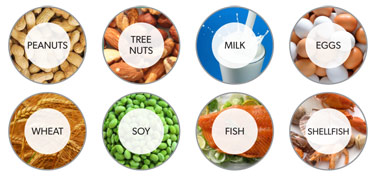Food Allergy Training & Certification

- Popular
- Top Allergens
- 10% OFF SALE
Popular Food Allergy & Handler Training
- California Food Allergy Training - $15.00
- California Food Handler Training - $7.00
- Florida Food Allergy Training – $15.00
- Florida Food Handler Training - $10.00
- Georgia Food Allergy Training – $15.00
- Louisiana Food Handler Training - $6.00
- Nevada Food Allergy Training – $15.00
- New York Food Allergy Training – $15.00
- New York Food Handler Training – $5.00
- Texas Food Allergy Training – $15.00
- Texas Food Handler Training – $7.00
- Washington Food Allergy Training - $15.00
Top Eight Allergens
The U.S. Food Allergen Labeling and Consumer Protection Act (FALCPA) identifies 8 foods or food groups as the major food allergens.

Why is Food Allergy Training important?
- Food allergy training could be the difference between life or death for a patron of your food service establishment or business.
- Researchers estimate that up to 15 million Americans have food allergies, including 5.9 million children under age 18 - that’s 1 in 13 children. Moreover, about 30% of children with food allergies are allergic to more than one food. Source: Food Allergy Research & Education
- With the number of people with food allergies and the number of recalls due to undeclared allergens increasing, food allergy training is an important component of any food service operation.
- While more than 160 foods can cause allergic reactions in people with food allergies, the law identifies the 8 most common allergenic foods.
- The U.S. Food Allergen Labeling and Consumer Protection Act (FALCPA) identifies 8 foods or food groups as the major food allergens. They are milk, eggs, fish (e.g., bass, flounder, cod), crustacean shellfish (e.g., crab, lobster, shrimp), tree nuts (e.g., almonds, walnuts, pecans), peanuts, wheat, and soybeans. They account for 90% of all allergic reactions.
Food Allergy Training
- Learn what is a food allergy, the different types of food allergens, how to identify symptoms of a food allergic reaction and what to do if a food allergic reaction occurs in a restaurant food service environment. This course is not currently accredited for: Illinois, Massachusetts, or Rhode Island.
- Food allergy training is designed to guide food service employees management, cooks, and servers - FOH/BOH staff) in the best practices for safely preparing food for and serving food allergic guests. View State Map
Food Manager Training & ANSI Certification
- Food establishments generally employ a person-in-charge (PIC) or a certified food manager (CFM) who requires food safety manager certification. These establishments include: bars, restaurants, mobile vendors, food trucks, caterers, assisted-living, prison facilities, and day care centers.
- The Food Safety Manager Principles Course provides the necessary training leading up to the Food Manager Certification Exam. This course covers food safety issues, regulations, and techniques to maintain a food-safe environment. View State Map
Food Handler Training
- Food handler safety training is necessary for employees in the food service and hospitality industry. Individuals working in food facilities who are involved in preparing, storing, or handling food are required to obtain a food handler certificate. This includes food employees that work in restaurants, cafes, bakeries, delis, mobile vendors, food trucks, bars, and convenience stores. View State Map
